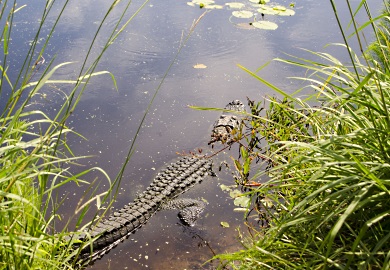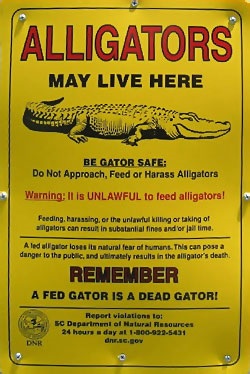May 1, 2019

A juvenile alligator rests at the edge of a small Lowcountry pond, likely waiting for a favored prey such as a fish, frog or aquatic snake to come withing reach.
As the weather warms up, alligators all over the state are coming out of their winter hiding places and basking in the sun, especially in the coastal plain. If you have never seen one of these impressive reptiles before, you might be surprised, or even intimidated, to see such an animal lying on the bank of your neighborhood pond, but there’s probably no reason to panic, according to the South Carolina Department of Natural Resources (SCDNR) wildlife biologists who manage this iconic species.
Many of the gators that inhabit the ponds of golf courses, resorts, communities and other areas with common greenspace that include prime alligator habitat are relatively small. It can take as long as a decade for an alligator hatchling to reach the six-foot length that is generally considered “adult” size. When left alone, smaller gators pose very little threat to people, according to SCDNR biologist and Alligator Program Coordinator Morgan Hart.
That may be true, but for many of the out-of-state visitors who flock to the Carolina coast in the summertime, and even for some native South Carolinians unused to seeing them, any alligator sighting may be a frightening event. Of the hundreds of alligator complaints reported to the SCDNR each season, more than half involve alligators less than 5 feet in length – animals that pose little, if any, threat to humans. Alligators of this size feed on crawfish, aquatic insects, small snakes, frogs, and turtles. The average body weight of alligators 3 feet in length is not quite 4 pounds. Four-foot alligators average about 11 pounds, while gators measuring 5 feet average only about 22 pounds. Just like any wild animal, even small alligators can bite, but as the old saying goes, “they are probably more afraid of you than you are of them.”
Alligators are cold-blooded (also called ectothermic), which means that they can’t produce their own body heat. When an alligator lies on grass or mud, fully out of the water, its primary goal is to soak up the heat from the sun. Alligators almost exclusively hunt from the water, so an alligator on land is most likely just trying to get warm and will retreat into the water if surprised or threatened. In the spring months, alligators roaming in search of new territories can result in animals that find themselves “stuck” away from their regular habitat. As the sun goes down, a piece of sun-warmed pavement such as a roadway, parking lot or driveway may seem like an attractive resting spot to the gator, which can cause traffic hazards or other public safety concerns.

Alligator warning signs such as this one are a common sight around freshwater access points and ponds in the South Carolina coastal plain and should always be heeded.
In that situation, the best thing to do is to notify either the appropriate Public Safety department for the town or county you are in, or the security staff if visiting a private resort or “plantation.” Most resorts and other private communities along the coast have signs advising who to call to report an out-of-place or potentially dangerous gator. The SCDNR may be called upon in such cases – typically to assist with gators that pose an immediate safety hazard. First responders will normally contact the SCDNR if that step is necessary, but citizens having questions or concerns about any alligator may also contact the SCDNR directly by calling 1-800-922-5431.
SCDNR conservation officers and biologists urge the public to be especially cautious around large alligators. While typically shy and inclined to avoid confrontations with people, alligators can be dangerous, especially if they have been fed in the past by humans, and people should always maintain a safe distance from ANY gator, regardless of size. Staying on marked paths and avoiding the edges of ponds or waterways – especially while walking pets – is a good safety practice, and NEVER throw food or other objects into the water where gators live.
While keeping those safety guidelines and information firmly in mind, understand that it isn’t necessary to call and report small gators that are simply basking near their normal habitat. By observing these simple safety rules, both citizens and visitors should be able to co-exist with gators.
“American alligators are native animals, and they deserve our respect, as they have an important role to play in South Carolina's ecosystems,” said Hart. “While we definitely don’t want to discourage people from calling-in any situation they feel could be dangerous, just be aware that smaller gators that are in their normal habitat do not typically pose a problem, so long as people keep a safe distance from them.”



